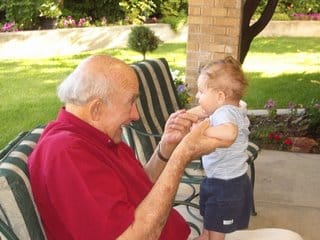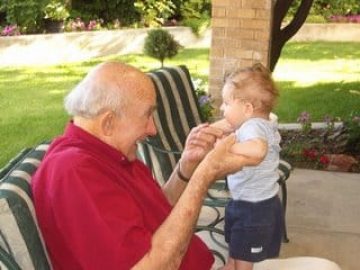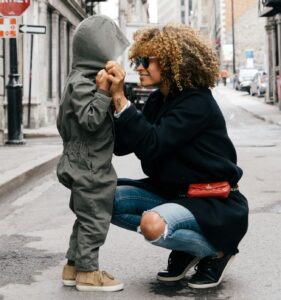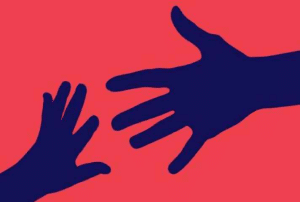 I thought this piece, the 1993 EXII Helen Candland Stark Personal Essay Contest winner, was appropriate after Father’s Day (which, like Mother’s Day can bring up a myriad of conflicting feelings). We often think about the different mothers in our lives. I hadn’t really thought about the different fathers in my life and my son’s (pictured here with his great-grandpa) until I read this. You can click here for the complete piece.
I thought this piece, the 1993 EXII Helen Candland Stark Personal Essay Contest winner, was appropriate after Father’s Day (which, like Mother’s Day can bring up a myriad of conflicting feelings). We often think about the different mothers in our lives. I hadn’t really thought about the different fathers in my life and my son’s (pictured here with his great-grandpa) until I read this. You can click here for the complete piece.
My son is sad because he knows that goodbye hurts. He was shattered by his parents’ divorce. When his father left, my son lost part of himself. I remember holding this sobbing child tightly in my arms every night, waiting for the uncontrollable crying to exhaust itself. I felt his profound hurt and grieved along with him. The precious family unit had been broken, and things would never be right again.
Now that I am a single parent, I realize that Heavenly Father has entrusted two very special children to my care: a tender, sensitive boy with a rich inner life, and a highly gifted and creative girl. I must protect and sustain them, binding their wounded spirits so that the healing process can begin. I must teach them to know and love their Heavenly Father, and I must nurture their special talents. The three of us will heal together and gather the blessings of a loving family life.
As I gaze at my son, I realize that—with his dark eyes and hair, jutting chin, and handsome features—he looks a great deal like his father. With apprehension, I realize that he is made in his father’s image. Some of the things he says remind me of his father, and I often wonder if he may have inherited negative personality traits from him as well. At the time the portrait was taken, his speech was unintelligible: loud, fast, gravelly, and with few consonants. His father had always spoken too loudly, and it seemed that my son was imitating him. His little shoulders would become tense, fists clench, and he would shout, then shout even louder when nobody could understand what he was saying. Yet, I knew that he is also made in his Heavenly Father’s image. With this seed of the divine, he has the potential to be a spiritually wise and loving person. I knew that I needed to counteract the negative influences from his early childhood, whether they be genetic or environmental, to help him find his spiritual father within himself. I worked with him carefully along with a speech therapist and enrolled him in a Christian nursery school. He learned to relax and to speak in a normal voice. He started to make friends, learned all about Jesus, and tried hard to be a good child whom people would like.
Yet, the following year was still difficult. He was angry much of the time and was afflicted by constant headaches. He spent much of his time lying on the floor, too lethargic to play or enjoy activities. Although he was enrolled in nursery school, he was often too sick to go. There was more speech therapy and, eventually, work with a chiropractor. Through it all, my son and I were constant companions. He accompanied me on walks, helped with the laundry, sat on the organ bench while I practiced, licked stamps, mailed letters, and sat through rehearsals. Eventually, his anger lessened, and the constant headaches left. Now, after a glorious summer of swimming, playing, music, and reading, he has become the healthy, hearty, delightful child I always knew he could be.
I have mothered this small child. Who will his fathers be? Scenes from the past three years flash across my inner eye like photographs of the mind. I see my little son at three, walking in the mall holdingin tightly to the hand of his grandfather who walks with a cane. He has just discovered that his grandfather’s slower pace is just right for his own short legs. They stroll behind us: the grandfather, tender and careful; the boy, trusting and happy. I remember my son three years later, playing ball outdoors with a family of my teenage cousins. His face glows with delight as he finds himself in a house full of older boys—boys who play catch with him in the backyard and teach him to dribblew a basketball. In quieter moments, I visualize him standing next to me by the piano, barely able to keep his active body still. He is singing “I am a Child of God” in a beautiful, clear soprano with the sweetness and faith that only a child can have.
He knows many fathers. There is our home teacher—a loving, patient father of three small girls. There is a married couple who share family home evening with us every Monday night. There are the men who dress up as Santa Claus and Santa’s elf for the ward Christmas party. There is our family chiropractor—a handsome, well-muscled man about my age. My son always gives him a big hug after his adjustment. Finally, there are his two uncles, mommy’s “little” brothers. Because he knows what it is like to be a little brother, he can identify with these men, no longer boys, who now have families of their own.
He knows his own father. Although my son visits with him once a month, he imagines that his father won’t recognize him when he is grown. He plans to seek him out and introduce himself. I wonder if he will see his resemblance to his father. By then life will have become his tutor and his own sweet spirit his guid. How much he is like his father will be his own choice. I will probable cry when it is time to say goodbye, but I am sure that he will have an image of himself that is joyful and positive in part because I have nurtured and mothered him. As I wish him a happy trip I will know that—no matter what fathers he chooses to pattern himself after—he will always see himself as a child of mine and a child of God.
Deborah Mayhew
Paramus, New Jersey
Volume 18 No. 1 (1993)






One Response
I have got to go to bed, but I love that picture. Dang, I hate summer, I’m way too hot and busy.
I’m coming back to read this. When the dust settles 🙂